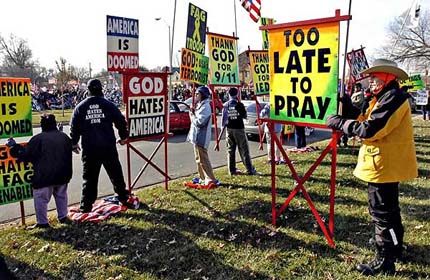
Marine Lance Corporal Philip J. Martini, 24, died in combat in Iraq from a gunshot wound. The mortal wound came during his second tour of duty in the country. Yesterday he was laid to rest in a Chicago area funeral, surrounded by family, friends, protestors and counter protestors.
The protest, like those at nearly every funeral of late for soldiers killed in Iraq, was staged by small (75-persons by some accounts) Westboro Baptist Church in Topeka, Kansas. Their spokeswoman Shirley Phelps-Roper told reporters yesterday, "This nation is being punished by a raging mad God." She went on to say, "I am the only patriot standing here. I am the only one that has enough concern for the soul of my nation and wrath of God pouring out on her head to tell you what you need to do to fix it."
Phelps-Roger said of the corporals parents, "They raised that child for the devil." Her few fellow demonstrators all agree that God is punishing our soldiers because of our nation's tolerance for homosexuality. Their signs read "God Hates America," "Not Blessed Just Cursed" and "God is America's Terror."
But the family and friends were shielded from the message of hate being spread by Westboro Baptist by nearly 200 members of the Patriot Guard Riders. The Riders are a morotcycle club who came for the purpose of staging a counter protest whose only purpose was to block the view of Westboro's slogans from those gathering to remember a soldier who paid the ultimate price for his service to our nation.

And if you thought, "There ought to be a law against that kind of thing" you are not alone. 27 states have either passed or are working on legislation aimed at stopping the Westboro Baptist protests at funerals while working to not unduly infringe on free speach in the process.
Of course, not everything Westboro's spokespersons say is counter to the beliefs of Christians. For example, Phelps-Rogers was also quoted as saying yesterday,
We're here to remind these people that there's a God. He set his standard in the earth and He expects his creatures to obey it. If you will obey the commandments of the Lord your God, He will bless you, if you will not obey the commandments of the Lord our God, He'll curse you, his promises are as good as gold.
I doubt you could muster much disagreement in Camden County from pulpit or pew alike on the statements that there is a God and that God has expectations. However, the protestors seem far too certain that God's love is for them and God's wrath is for others—people who are "other" than them. This makes it that much easier to side with the love of the bikers shielding the family than the hatred of the Westboro protestors.
But what about the larger issue? What basis do I have for taking exception with the (if nothing else) very dedicated members of Westboro Baptist? Certainly scripture tells of judgment. There is no doubt about that. But when I read of Jesus' life, ministry and teachings, the only strong words of judgement and harsh actions I see are aimed at the holier than thou set. Jesus never held back from taking the self righteous to task. That's what I read in the Gospels and it informs how I view the protests and counter protests.
While I hope the opportunity never arises, I would have to count myself among the human shields before I could ever stand in hatred with the protestors. And it is some comfort that this is a common Christian viewpoint. As much as we can be divided at times, I hope it is reaching out in love that draws Christians together, for the Bible teaches that God is love. It is in acts of love, not hatred, that we side with our Lord.
peace,
Frank+
The Rev. Frank Logue, Pastor +
King of Peace Episcopal CHurch
 This morning, I worshipped at Saint Boniface Episcopal Church on Siesta Key in Sarasota, Florida. While I always enjoy being at King of Peace, it was also a joy to worship with another community of faith and to enjoy their own unique rhythms and gifts. Their buildings and grounds were thoughtfully designed with a beautiful, and wonderfully consistent artistic sensibility. The church boasts an admirable array of programs and outreach, which includes a preschool with the best church playground ever (it had climbing trees within the playground).
This morning, I worshipped at Saint Boniface Episcopal Church on Siesta Key in Sarasota, Florida. While I always enjoy being at King of Peace, it was also a joy to worship with another community of faith and to enjoy their own unique rhythms and gifts. Their buildings and grounds were thoughtfully designed with a beautiful, and wonderfully consistent artistic sensibility. The church boasts an admirable array of programs and outreach, which includes a preschool with the best church playground ever (it had climbing trees within the playground).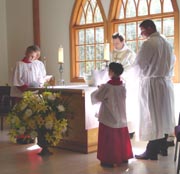 We declare to you what was from the beginning, what we have heard, what we have seen with our eyes, what we have looked at and touched with our hands, concerning the word of life—this life was revealed, and we have seen it and testify to it, and declare to you the eternal life that was with the Father and was revealed to us—we declare to you what we have seen and heard so that you also may have fellowship with us; and truly our fellowship is with the Father and with his Son Jesus Christ.
We declare to you what was from the beginning, what we have heard, what we have seen with our eyes, what we have looked at and touched with our hands, concerning the word of life—this life was revealed, and we have seen it and testify to it, and declare to you the eternal life that was with the Father and was revealed to us—we declare to you what we have seen and heard so that you also may have fellowship with us; and truly our fellowship is with the Father and with his Son Jesus Christ.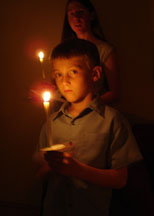 The word translated as "fellowship" here is the Greek word koinonia which also means "communion." Koinonia is a close connection. To have koinonia with something or someone is to participate with it and in it. Through our communion with God, we are in communion with all those with whom God is in communion. It is this deeper connectedness of communion which we establish by our faith in Jesus Christ as evidenced through our baptisms (see yesterday's post below).
The word translated as "fellowship" here is the Greek word koinonia which also means "communion." Koinonia is a close connection. To have koinonia with something or someone is to participate with it and in it. Through our communion with God, we are in communion with all those with whom God is in communion. It is this deeper connectedness of communion which we establish by our faith in Jesus Christ as evidenced through our baptisms (see yesterday's post below). I am still at the
I am still at the 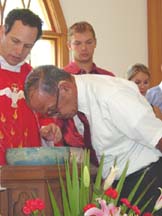 I have spent the day with people who are all convinced about this, as I am. But what about the world wide web out there? How important is this oneness we share with all Christians in baptism? How important is the fact that scripture considers all who have been baptized to be both saints, and ministers of the Gospel?
I have spent the day with people who are all convinced about this, as I am. But what about the world wide web out there? How important is this oneness we share with all Christians in baptism? How important is the fact that scripture considers all who have been baptized to be both saints, and ministers of the Gospel?

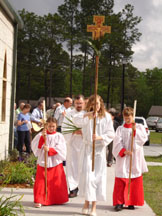

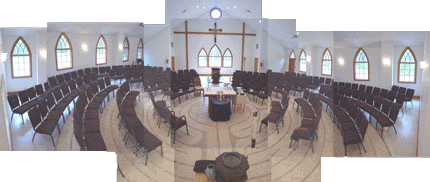

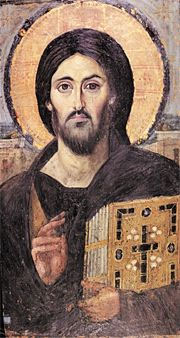 Jesus isn't some kind of heavenly Rapunzel, letting down those flowing straight blond locks the cheesy European and American paintings give him so we can climb up to join him in his elevated but isolated tower. Jesus is engaged with the world. He is the Word who was with God in the very beginning, and whose love was present in the world's birth. He is the peasant child who knew and loved the earth he walked and all those who walk with him. He is the naked, vulnerable and tortured man nailed to immovable wood and still moved with compassion for his torturers. He has died, and he is risen, and yet he comes again, to touch doubters and healers, soldiers and peasants, persecutors and apostles -- who are sometimes the same people, after all … especially after Jesus' touch.
Jesus isn't some kind of heavenly Rapunzel, letting down those flowing straight blond locks the cheesy European and American paintings give him so we can climb up to join him in his elevated but isolated tower. Jesus is engaged with the world. He is the Word who was with God in the very beginning, and whose love was present in the world's birth. He is the peasant child who knew and loved the earth he walked and all those who walk with him. He is the naked, vulnerable and tortured man nailed to immovable wood and still moved with compassion for his torturers. He has died, and he is risen, and yet he comes again, to touch doubters and healers, soldiers and peasants, persecutors and apostles -- who are sometimes the same people, after all … especially after Jesus' touch.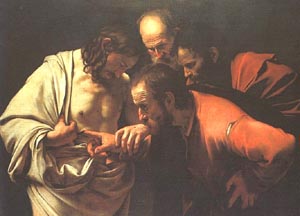 What he really said was “Shalom be with you.” The Hebrew word Shalom means more than our word “peace.” Shalom means “well-being, health, happiness, and peace.” It means all of those things together. Shalom is better understood as wholeness or completeness. In the Old Testament, the fullness of Shalom could only come as a gift from God. The same is true in the New Testament where shalom is the gift that Jesus brings as he enters into the doubt, indecision, and confusion after his death. Jesus still wants God’s wholeness and well-being for us.
What he really said was “Shalom be with you.” The Hebrew word Shalom means more than our word “peace.” Shalom means “well-being, health, happiness, and peace.” It means all of those things together. Shalom is better understood as wholeness or completeness. In the Old Testament, the fullness of Shalom could only come as a gift from God. The same is true in the New Testament where shalom is the gift that Jesus brings as he enters into the doubt, indecision, and confusion after his death. Jesus still wants God’s wholeness and well-being for us.

 And if you thought, "There ought to be a law against that kind of thing" you are not alone. 27 states have either passed or are working on legislation aimed at stopping the Westboro Baptist protests at funerals while working to not unduly infringe on free speach in the process.
And if you thought, "There ought to be a law against that kind of thing" you are not alone. 27 states have either passed or are working on legislation aimed at stopping the Westboro Baptist protests at funerals while working to not unduly infringe on free speach in the process. 
 In her book Amazing Grace: a vocabulary of faith Kathleen Norris writes of attending a Bible Study saying
In her book Amazing Grace: a vocabulary of faith Kathleen Norris writes of attending a Bible Study saying You may be thinking, “Well, you must have been judging yourself to come to such a conclusion. If you had been engrossed in your own spiritual work, you would not have been studying these people.”
You may be thinking, “Well, you must have been judging yourself to come to such a conclusion. If you had been engrossed in your own spiritual work, you would not have been studying these people.” 
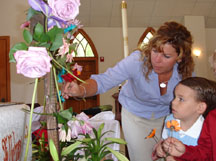
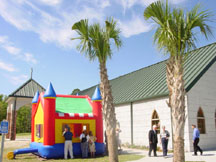
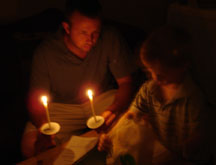
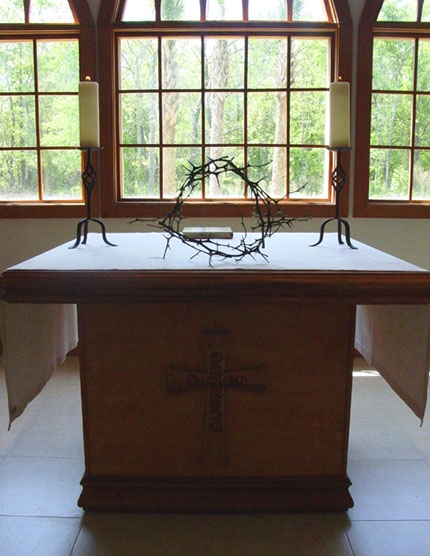
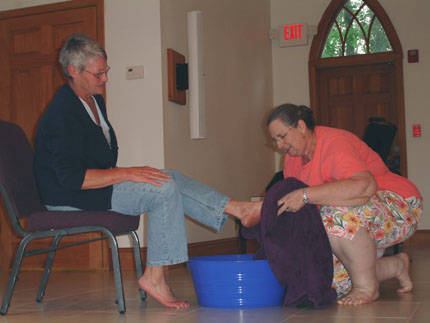
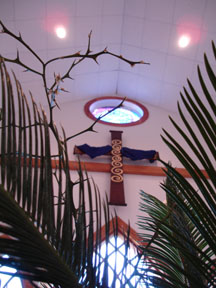

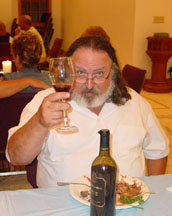
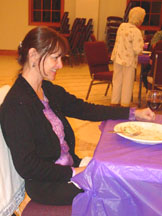
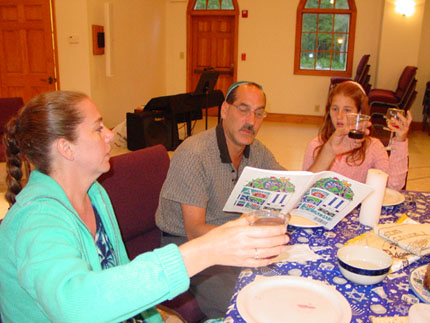
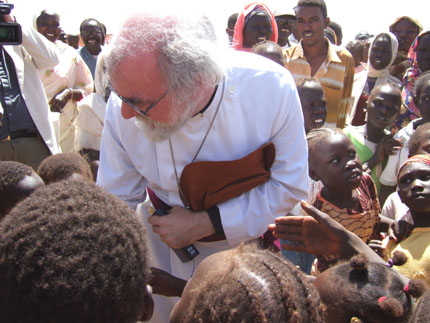
 Pretty well everything, every aspect of that environment, seemed set to remind us that we still lived in a world where the cross was the immediate reality and resurrection hope was definitely a thing of the future. Hunger, desperate poverty, the traces of unspeakable trauma and violence, and the present reality of the same unspeakable brutality not too far away in Darfur – this, surely, was a world untouched by Easter.
Pretty well everything, every aspect of that environment, seemed set to remind us that we still lived in a world where the cross was the immediate reality and resurrection hope was definitely a thing of the future. Hunger, desperate poverty, the traces of unspeakable trauma and violence, and the present reality of the same unspeakable brutality not too far away in Darfur – this, surely, was a world untouched by Easter. Where would Jesus live? In a red state or a blue state? According to an editorial from Sunday, the answer is neither, or both, depending on how you look at it.
Where would Jesus live? In a red state or a blue state? According to an editorial from Sunday, the answer is neither, or both, depending on how you look at it. 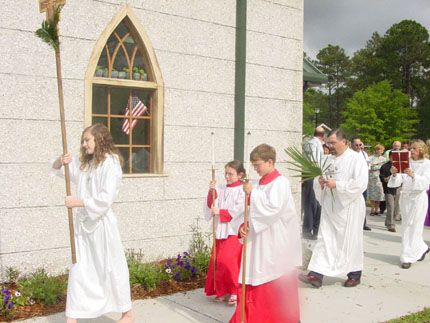

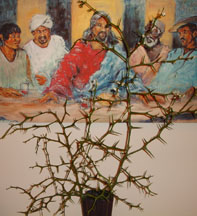

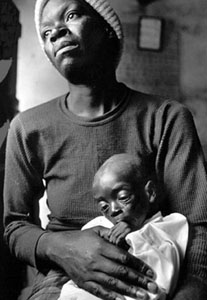 On this Palm Sunday when we read of Jesus death on the cross, word comes in
On this Palm Sunday when we read of Jesus death on the cross, word comes in 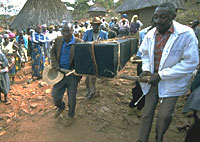 The problems of Zimbabwe are a complex mix of issues created in part by a corrupt leader and an initial cultural inability to deal frankly with a disease transmitted primarily through non-monagamous sexual contact. But the problems they face do not belong to Zimbabwe alone. We in America also struggled with how to come to terms with AIDS when the epidemic hit here. And we too face problems with unchecked greed as the recent trial of Enron's executives shows.
The problems of Zimbabwe are a complex mix of issues created in part by a corrupt leader and an initial cultural inability to deal frankly with a disease transmitted primarily through non-monagamous sexual contact. But the problems they face do not belong to Zimbabwe alone. We in America also struggled with how to come to terms with AIDS when the epidemic hit here. And we too face problems with unchecked greed as the recent trial of Enron's executives shows.  Tomorrow is Palm Sunday and the
Tomorrow is Palm Sunday and the 
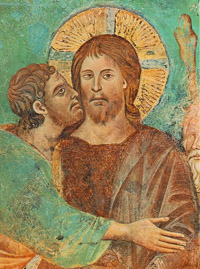 But the discovery of the actual 26-page Coptic text is news and will allow us all to find out more about this ancient Gnostic document. The New York Times online article included a link to
But the discovery of the actual 26-page Coptic text is news and will allow us all to find out more about this ancient Gnostic document. The New York Times online article included a link to 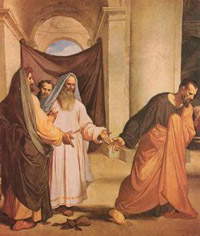 Irenaeus, the Bishop of Lyon, wrote of the Gnostics (around 180 A.D.) saying in part of his defense against them, "They produce a fictitious history of this kind, which they style the Gospel of Judas."
Irenaeus, the Bishop of Lyon, wrote of the Gnostics (around 180 A.D.) saying in part of his defense against them, "They produce a fictitious history of this kind, which they style the Gospel of Judas."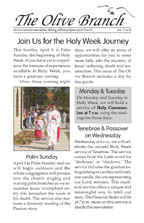
 The study found that a period of cooler temperatures in the area between 1,500 and 2,600 years ago could have included the decades in which Jesus lived. A drop in temperature below freezing could have caused ice thick enough to support a human to form on the surface of the freshwater lake near the western shore, Nof said. It might have been nearly impossible for distant observers to see a piece of floating ice surrounded by water.
The study found that a period of cooler temperatures in the area between 1,500 and 2,600 years ago could have included the decades in which Jesus lived. A drop in temperature below freezing could have caused ice thick enough to support a human to form on the surface of the freshwater lake near the western shore, Nof said. It might have been nearly impossible for distant observers to see a piece of floating ice surrounded by water.
 In Savannah yesterday, I heard of a
In Savannah yesterday, I heard of a 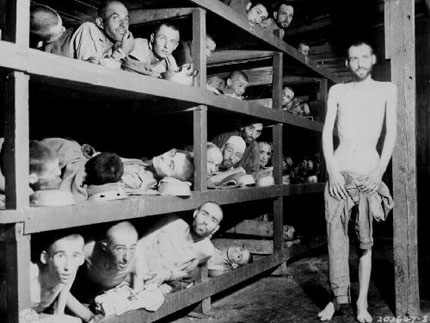
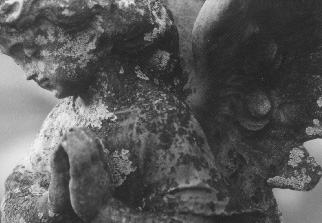
 That person, insisted Father Schmemann, was an angel of God. She brought the shock of revelation, the shock that was needed for him to see that what was here was much, much more than an ugly old woman. Next time he would be able to look at an unattractive person in a self-effacing, uninterferring way. It takes practice, however, to spot angelic presences, just as it takes practice to recognize God.
That person, insisted Father Schmemann, was an angel of God. She brought the shock of revelation, the shock that was needed for him to see that what was here was much, much more than an ugly old woman. Next time he would be able to look at an unattractive person in a self-effacing, uninterferring way. It takes practice, however, to spot angelic presences, just as it takes practice to recognize God.






1 Comments:
At 4/06/2007 4:13 PM, Anonymous said…
Anonymous said…
I just went to the Baptist church in our community and with 3 other churches involved it sure is an inspiration to see that God is worshiped and praised if very similar fashion. We all came together in the family of God. Have a great Easter and God bless. In Christian love John
Post a Comment
<< Home